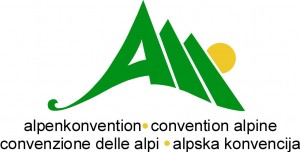The Transport Protocol of Alpine Convention ratified by the European Union
PERMANENT SECRETARIAT
OF THE ALPINE CONVENTION
PRESS RELEASE
10.6.2013 – the Alps are closer to the political heart of Europe: the Council of the European Union, supported by the European Parliament finally ratified the Alpine Convention’s Transport Protocol, approving a proposal by the Commission of 2008. This ratification has an enormous political significance for the Alps since the Alpine Convention officially becomes a priority of the EU policy on transport. This relates not only to the continued financial support to Transeuropean Railway Corridors but to all measures which contribute to reducing the environmental impact of transport and optimize mobility through and within the Alps.
The Secretary General of the Alpine Convention, Marco Onida, who has been personally lobbying for the ratification process for many years, expresses “great satisfaction for this decision, which follows of a few months the ratification by Italy”. Onida points to the fact that the “key role played by the Alps is openly recognized in the European transport policy” and underlines the “important support by Mr. Pat Cox, coordinator of the Trans-European Transport Network (TEN-T) Railway axis Berlin-Palermo, who contributed decisively to the progress towards the ratification.”
The Protocol is a step towards an improved international coordination and management of trans-alpine transport; it strongly supports modal shift, in particular by promoting alternative modes of transport than road, especially for freight transport. It provides a framework for accompanying measures and contributes to lessening the fragmentation of pan Alpine transport policy.
The Transport protocol of the Alpine Convention was signed in 2000 and aims at reconciling the need to ensure accessibility and possibility to cross the Alps with the need to preserve vulnerable environment and landscapes. Even if inhabitants of central and peripheral Alpine regions benefit from better accessibility, the environmental effects of increasing transport are far greater than in the plains. The narrow valleys amplify the effects of pollutants and noise. Moreover, transport infrastructure is more expensive to build and maintain, it impacts on the landscape and is linked to the consumption of scarce soil reserves. Freight transport on transit roads has generated massive protests in recent years. On all transalpine roads transport increases much faster than rail.
The Alpine Convention, signed in 1991 and in force since 1995, is an international Treaty between the eight Alpine countries (Austria, Germany, France, Italy, Liechtenstein, Monaco, Switzerland and Slovenia) as well as the European Union, which aims at promoting the protection of the Alps and their sustainable development. The Alpine Convention is the world’s first legally binding international Treaty for the protection of a mountain range.
Contact: Marco Onida, Tel. +43 650 588 5892
www.alpconv.org
